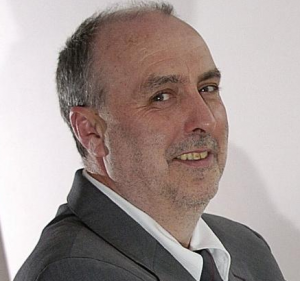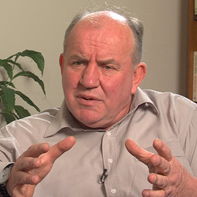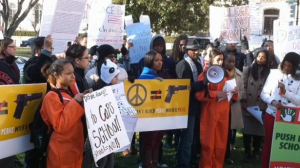News & Announcements
 Twenty community members from across the Lehigh Valley, Pennsylvania, USA, met Tuesday, March 26, to hear about creating a "restorative zone."
Twenty community members from across the Lehigh Valley, Pennsylvania, USA, met Tuesday, March 26, to hear about creating a "restorative zone."
The meeting was led by IIRP president Ted Wachtel and assistant professor and director of continuing education John Bailie, with presentations by Bethlehem Area School District supervisor of minority affairs Vivian Robledo-Shorey and Allentown School District executive director of community & student services Susan Lozada.
Participants included a Pennsylvania state police officer, Allentown Mayor's Office and the Lehigh Valley District Attorney's Office representatives, Allentown and Bethlehem school district administrators, a Lehigh University professor, an attorney, several pastors, community center leaders and social services providers.
 Paul O'Hara, Bradford Youth Offending Team Manager
Paul O'Hara, Bradford Youth Offending Team Manager
A recent article from the Bradford Telegraph and Argus, "MPs call to support successful 'restorative justice' scheme," is indicative of the kind of local support that restorative justice enjoys throughout many areas of the U.K.
The piece frames the issue in terms of a call for more money to support restorative justice programs for youth at the request of "an all-party committee."
In the U.K., youth offending teams, or YOTs, have been set up across the country. The team "sets up community services and reparation plans, and attempts to prevent youth recidivism and incarceration." (via Wikipedia) Many YOTs have adopted restorative justice as an important aspect of their work.
Paul O’Hara, the Bradford youth offending team (YOT) manager, is quoted in the article as saying, “I have queues of parents outside these clinics, who are desperate for an opportunity for their children to be given another chance.
“To date, it is still very early days, but there is a 90 per cent success rate. There is a very high level of satisfaction and a high level of involvement from victims.”
The full article can be read here.
 According to Amy Norton, writing for U.S. News and World Report, the American Academy of Pediatrics has taken a public stance against the use of suspensions and expulsions in schools. The article begins:
According to Amy Norton, writing for U.S. News and World Report, the American Academy of Pediatrics has taken a public stance against the use of suspensions and expulsions in schools. The article begins:
Suspending or expelling a child from school should be a rare last resort and not a routine punishment for bullying, drug use or other infractions, according to a new policy statement from the American Academy of Pediatrics (AAP).
The AAP, a leading group of pediatricians, said school "zero-tolerance" policies toward kids' behavior problems do no good.
 Terry O’Connell, director of Real Justice Australia, a division of the International Institute for Restorative Practices (IIRP), is a retired 30-year veteran with the New South Wales Police Service, and well known as the "cop from Wagga Wagga" who developed what is now the IIRP’s Real Justice restorative conference model.
Terry O’Connell, director of Real Justice Australia, a division of the International Institute for Restorative Practices (IIRP), is a retired 30-year veteran with the New South Wales Police Service, and well known as the "cop from Wagga Wagga" who developed what is now the IIRP’s Real Justice restorative conference model.
IIRP president Ted Wachtel first heard O’Connell speak in 1994 in Pennsylvania, and was so taken with O’Connell’s work adapting the New Zealand model of family group conferencing that he founded Real Justice, now the IIRP’s restorative justice program.
The IIRP has promoted the use of O’Connell’s restorative conference process based on his "restorative questions," which foster empathy and shared understanding among offenders, victims and their respective friends and family members.
 Not long ago I was driving in my car and tuned to my local free radio station. I was pleasantly surprised to find myself listening to an hour-long interview about restorative justice with Danielle of New York City based Rockdove Collective. She is very articulate about restorative justice and also discusses some unique ways that restorative justice can be used to support victims of domestic violence. In place of a Sunday video, this week I'm posting the full audio interview.
Not long ago I was driving in my car and tuned to my local free radio station. I was pleasantly surprised to find myself listening to an hour-long interview about restorative justice with Danielle of New York City based Rockdove Collective. She is very articulate about restorative justice and also discusses some unique ways that restorative justice can be used to support victims of domestic violence. In place of a Sunday video, this week I'm posting the full audio interview.
[audio:http://www.madnessradio.net/audio/download/126/MadnessRadio-2007-03-14RestorativeJustice.mp3|titles=Danielle of Rockdove Collective speaking about restorative justice on Madness Radio]
Download here.
This program from Madness Radio with Will Hall is licensed Creative Commons BY-NC-ND – original web page here.
From an article from Edmonton, Canada about how restorative practices are being applied in a middle school:
When Spencer Cummings' peers at school started saying "stupid things" and insulting him, the 13-year-old sat in a circle alongside those students and the school principal to explain how the situation made him feel.
It gave Spencer the chance to articulate his hurt feelings and help resolve the conflict. He said the method was more empowering than the traditional approach of having the principal or teacher handle the discipline.
"I could explain to the kids why I thought that was wrong, even though they might know it was wrong," said Spencer, a student at Fultonvale Elementary Junior High School in Sherwood Park.
"Then we talked about what we could do in the future to resolve this issue. I didn't have many issues at all after that....
"I felt really good about it. We just talked out our issues as a group and I didn't find it intimidating because we were just really calm about it. We talked to each other about how we really felt about it and what we thought we all could have done better."
Read "Students form sharing circles rather than play blame game" by Andrea Sands for the Edmonton Journal.
 Photo by Elliott Francis for WAMU
Photo by Elliott Francis for WAMU
There's a great new web site resource created by the Advancement Project called Ending the Schoolhouse to Jailhouse Track. This phrase is synonymous to the more familiar one, "ending the school-to-prison pipeline." The site includes news, a map of the movement, success stories, an invitation to attend "action camp," a link to "submit your story" and much more, including links for ways parents, students, teachers, law enforcement and activists can get involved.
Click here to visit the web site.
In a related bit of news from WAMU (American University public radio in Washington, D.C.) states, "A coalition of students is demanding that Congress reject legislation that promotes the use of police or armed guards in public schools." One student is quoted as saying, "We know already in our communities that police don't make our schools any safer."
A transcript of the piece and a link to listen to the radio report can be found here.
Les Davey, director of IIRP UK & Ireland, emailed an update on the 1-day conference being planned for June 20, 2013 in Salford, Manchester, UK. He writes, "The programme is coming together nicely with both national and international plenaries plus a wide choice of workshops across Justice, Communities, Education and Care."
According to Nirvi Shah, writing for EdWeek:
A panel of school safety, climate, and security experts quizzed by a House committee today largely agreed that schools need more counselors, better communication between adults on campus and students, and additional, thoughtful emergency planning.
One thing they don't need, according to the experts: Teachers carrying guns to class.
Shah quotes David Osher of the American Institutes for Research, who she calls a "school climate guru": "The real challenge in schools is not the low-incidence and very traumatic events we want to prevent. It's low-level aggression that takes place persistently."
Shah points out that "Combating that, and ultimately preventing more serious events, begins with forming trusting relationships between students and adults, especially school resource officers and counselors." [emphasis added]
The complete article can be found here.
On Februrary 6 there was an interesting bit of news from the Restorative Justice Council, which notes a recommendation in a recent U.K. government report that restorative justice presents a "rich avenue for improving the handling of police complaints." The report also recommends, "The Commission should set out best practice protocols for their use in appropriate cases and the use of informal or local resolution systems should be independently monitored to ensure that it is not used inappropriately in relation to conduct that would justify criminal or disciplinary proceedings."
